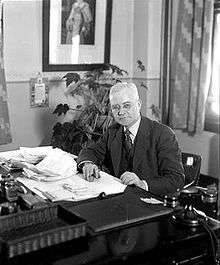Dan Knott
| Dan Knott | |
|---|---|
|
| |
| 20th Mayor of Edmonton | |
|
In office November 11, 1931 – November 14, 1934 | |
| Preceded by | James McCrie Douglas |
| Succeeded by | Joseph Clarke |
| Alderman on the Edmonton City Council | |
|
In office December 11, 1922 – December 13, 1926 | |
|
In office December 9, 1929 – November 11, 1931 | |
|
In office November 10, 1937 – November 12, 1941 | |
| Personal details | |
| Born |
July 1, 1879 Collingwood, Ontario |
| Died |
November 26, 1959 (aged 80) Edmonton, Alberta |
| Political party | Labour, Citizens Committee |
| Other political affiliations | Independent |
| Spouse(s) | Mina Matheson |
| Children | Two sons |
| Profession | Printer, teacher |
| Signature |
 |
Daniel Kennedy Knott (July 1, 1879 – November 26, 1959) was a labour activist and politician in Alberta, Canada and a mayor of Edmonton.
Early life
Dan Knott was born in Collingwood, Ontario on July 1, 1879 to Hugh Knott and Margaret Wright.[1] He apprenticed as a printer and worked for the Buffalo Express before moving to Alberta in 1905 to join his father and brother, who had come west two years earlier. He joined the Edmonton Bulletin in 1906, and later worked for the Calgary Herald. In 1909 he became a linotype operator for the Edmonton Journal; he would hold that position until his retirement.
He married Mina Matheson in 1907; the couple would have two sons.
Labour Activism
In 1910, Knott became president of the local typographical union. He was a member of labour's moderate wing.
He rose through the ranks of organized labour and was a member of the Edmonton Trades & Labour Council's executive committee and strike committee (along with future municipal colleagues Alfred Farmilo and Elmer Ernest Roper) by the time of the 1919 city-wide strike (held in sympathy with the Winnipeg General Strike of 1919). Knott and other moderates negotiated with then-mayor Joseph Clarke to allow the provision of vital services. In this way, Clarke resisted calls to bring in strikebreakers, such as troops or "special constables" such as were used in Winnipeg to break up the general strike there.
In 1922, Knott was a co-founder of an iteration of the Canadian Labour Party, with which he remained active until its 1935 merger with the Co-operative Commonwealth Federation.
Elected Politics
In the aftermath of the 1919 strike, organized labour sought an increased say in Edmonton's governance. As part of this trend, Knott ran for a position as alderman on Edmonton City Council during the 1920 election. He finished tenth of sixteen candidates and was not elected, but was more successful during the 1922 election, when he finished sixth of sixteen and became one of six candidates elected. He was re-elected in 1924 election.
During the 1926 election campaign, Knott made his first bid for mayor, seeking to take advantage of Kenny Blatchford's retirement from municipal politics. He was unsuccessful in the six-person race that was won by Ambrose Bury. He was one of three candidates to oppose Bury's re-election bid in the 1927 election, but finished second as Bury received more than half the vote.
Knott returned to office as an alderman after the 1929 election, in which he finished fourth of fifteen candidates, but elected to run for mayor again rather than seek re-election at the expiration of his two year term. As the lone challenger to incumbent James McCrie Douglas, Knott won fifty-eight percent of the vote and was elected. He was re-elected in the 1932 and the 1933 elections.

As mayor, Knott was a disappointment to many of the labour activists who had helped elect him. In an effort to maintain the city's credit rating and to avoid raising property taxes, he abandoned many of the promises that had brought him to office, especially in the area of public sector job creation. In 1932, he acceded to Premier John Brownlee's request for city police to suppress a hunger march protest.
While several labour activists, notably city councillor Margaret Crang, denounced Knott as a turncoat, he was able to implement his agenda due to the combined support of Labour Party members who remained loyal to him and moderates on his political right. However, by the 1934 election much of his support was exhausted and he finished third of five candidates, behind his old negotiating partner Joseph Clarke and alderman James Ogilvie.
He attempted to return to council as an alderman in the 1936 election, but was soundly defeated, finishing thirteenth of sixteen candidates. He was elected in 1937, and re-elected in the 1939 election. He was defeated in the 1941 election, in what would be his final bid for elected office.
Personal life, death, and legacy
Dan Knott was a member of the Masonic Order and the local hospital and library boards. He was an avid bowler, and led the team that swept the 1911 American Bowling Congress in Spokane.
Daniel Kennedy Knott died November 26, 1959. Dan Knott Junior High School is named in his honour.
References
- Edmonton Public Library Biography of Dan Knott
- City of Edmonton biography of Dan Knott
- Account of the 1919 Edmonton strike from the Labour News at the Wayback Machine (archived October 26, 2009)
- "History of labour's involvement in Edmonton politics from the Edmonton Bullet". Archived from the original on October 27, 2009. Retrieved October 25, 2009.
- Account of Dan Knott's time as mayor from edmontonhistory.ca
| Preceded by James McCrie Douglas |
Mayor of Edmonton 1931–1934 |
Succeeded by Joseph Clarke |